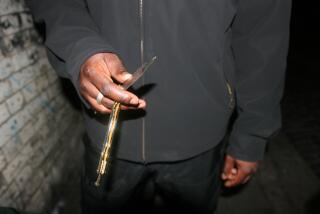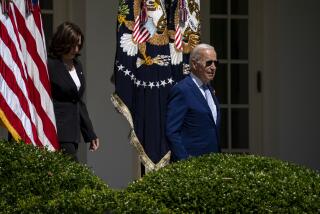Gun owners hope to win the right to carry concealed weapons
- Share via
Chuck Michel’s strategy for crime-fighting rests on the element of surprise: Keep the bad guys guessing who’s armed and who’s not.
“If 5% of the ducks could shoot back, you’re not going to go duck hunting,” said the Long Beach lawyer representing many Californians denied concealed weapons permits and, in his view, their constitutional right to self-defense.
For decades, that argument has fallen flat in the courtroom. Judges have routinely held that denying permits to carry loaded firearms in public does not infringe on gun owners’ right to keep and bear arms.
But now, some gun owners hope that courts will soon reverse course and find that they have a right to secretly tote their weapons in public. Ironically, their optimism stems from a piece of gun control legislation that took effect last month and bans them from openly carrying even unloaded handguns.
Courts have upheld local law enforcement officials’ authority to deny concealed weapons permits in part because “you had the opportunity to openly carry an unloaded weapon and in the event of an emergency you can quickly load and defend yourself,” said Adam Winkler, a UCLA law professor and author of “Gunfight: The Battle Over the Right to Bear Arms in America.” “Now that option has been taken off the table.”
Open carrying of an unloaded weapon never satisfied gun rights advocates like Michel, who have been challenging — unsuccessfully — California’s ever-tightening restrictions on who can buy guns; what guns are legal; and when, where, how and if weapons can be carried outside the home. The new law, Michel said, has given him the ammunition he needs to win in court.
Although gun owners can easily qualify for concealed permits in some remote and rural counties, it is all but impossible for residents of densely populated counties, where the majority of Californians live, unless the gun owner can prove an actual threat.
“California is a stand-alone where you can’t carry an unconcealed and unloaded gun and you can’t get a permit to carry one concealed,” Michel said, arguing that the state is out of step with at least 40 others that issue concealed-carry permits to any applicant with a clean slate.
From his law office bedecked with guns, ammo and Old West memorabilia, Michel keeps a close eye on the U.S. Supreme Court and believes the justices are on the lookout for the appropriate right-to-carry case to find a constitutional right to carry loaded guns for self-protection.
The justices issued a watershed ruling in 2008 in the case of Heller vs. District of Columbia, recognizing for the first time since Civil War days a citizen’s right to keep a weapon at home for self-protection. Gun rights groups had watched carefully for years to find the most sympathetic plaintiffs to make the point that residents of the crime-ridden national capital were being denied a means of self-defense by the district’s ban on handguns, Winkler said. Two years later, in McDonald vs. Chicago, the high court extended that right to the states as well as federal territory.
Those seeking recognition of a right to carry guns have petitioned the Supreme Court to review several cases since Heller in which gun owners failed to convince ower courts that their rights were being denied. The justices have so far declined to address the right-to-carry question, probably because those cases involved plaintiffs appealing convictions for illegal firearms possession or denial of carry rights to applicants with stains on their records, Winkler said.
Those who support strict gun control say the court deliberately limited its Heller ruling to recognize only a right to keep a gun at home.
“I expect the Supreme Court to decide as courts around the country have decided in hundreds of cases that there is not a 2nd Amendment right to carry guns in public places,” said Jonathan E. Lowy, legal action director for the Brady Center to Prevent Gun Violence.
Assemblyman Anthony Portantino, who sponsored the new ban on open carry, likewise brushed off the gun lobby’s contention that gun control supporters have shot themselves in the foot.
“Obviously the pro-gun person is going to look for anything to spin a pro-gun agenda,” said the La Cañada Flintridge Democrat. “This is a reasonable move to close a loophole, and we are confident it will stand up in court.”
Portantino proposed the open-carry ban after gun owners began protesting in demand of carry rights by converging by the dozens on coffee shops with Berettas and Smith & Wessons riding on their hips.
As concealed-carry permits became more difficult to get, Eduard Peruta, a client of Michel’s, took his protest to the courts.
A semi-retired investigator from San Diego who wanted protection for himself and his wife when they traveled to remote places in their motor home, Peruta applied for a concealed weapons permit but was denied because “generalized fear for one’s personal safety” doesn’t meet county authorities’ definition of what amounts to “good cause” to carry a weapon. As do most other populous counties, San Diego requires applicants to demonstrate a specific and verifiable threat to their lives.
In his lawsuit, Peruta also accused San Diego County Sheriff William Gore of violating his equal protection rights by issuing concealed-carry permits more liberally to members of the Honorary Deputy Sheriff’s Assn., which raises funds for law enforcement. Peruta lost the case, and it is now pending appeal.
There is also gross inconsistency among authorities in California’s 58 counties on what constitutes good cause, which could lead to courts finding equal protection violations, said Stephen Halbrook, a Virginia attorney and frequent litigator for the National Rifle Assn. In remote Plumas County, one in 39 adults has a carry permit, according to state Department of Justice statistics for 2011. In Los Angeles County, one in 33,700 adults is licensed to carry, and in San Francisco the latest records show zero civilian holders among the county’s 700,000 adults.
Statewide, the number of civilians with concealed weapons permits is 32,666, or 0.1% of the adult population. That compares with about 5% licensed to carry nationwide, according to Calguns Foundation chief Gene Hoffman.
Halbrook says Peruta and a handful of other carry challenges from California could eventually get the justices’ attention, along with a lawsuit by a 71-year-old Illinois woman beaten and left for dead in a 2009 robbery of her church treasury office. The woman, Mary Shepard, had sought and been denied a carry permit.
“You always want to put your best foot forward,” Halbrook said of the strategy that succeeded in Heller.



